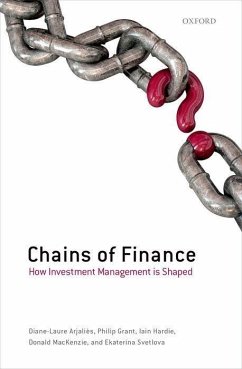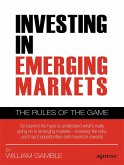Diane-Laure Arjalies, Philip Grant, Iain Hardie, Donald Mackenzie, Ekaterina Svetlova
Chains of Finance
How Investment Management Is Shaped
Diane-Laure Arjalies, Philip Grant, Iain Hardie, Donald Mackenzie, Ekaterina Svetlova
Chains of Finance
How Investment Management Is Shaped
- Gebundenes Buch
- Merkliste
- Auf die Merkliste
- Bewerten Bewerten
- Teilen
- Produkt teilen
- Produkterinnerung
- Produkterinnerung
This book suggests that investment decisions cannot be understood by focusing on isolated investors. Rather, most of their money flows through a chain: a sequence of intermediaries that 'sit between' savers and companies/governments. It argues that investment management is shaped by the opportunities and constraints that this chain creates.
Andere Kunden interessierten sich auch für
![Investing in Emerging Markets Investing in Emerging Markets]() William B. GambleInvesting in Emerging Markets21,99 €
William B. GambleInvesting in Emerging Markets21,99 €![The Oxford Handbook of Regulation The Oxford Handbook of Regulation]() The Oxford Handbook of Regulation209,99 €
The Oxford Handbook of Regulation209,99 €![The Dynamic American Firm The Dynamic American Firm]() Kenneth ChiltonThe Dynamic American Firm77,99 €
Kenneth ChiltonThe Dynamic American Firm77,99 €![Mergers & Acquisitions Mergers & Acquisitions]() Michael A. HittMergers & Acquisitions76,99 €
Michael A. HittMergers & Acquisitions76,99 €![Global Cosmopolitans Global Cosmopolitans]() Linda BrimmGlobal Cosmopolitans49,99 €
Linda BrimmGlobal Cosmopolitans49,99 €![Forex for Beginners Forex for Beginners]() Adam KritzerForex for Beginners41,99 €
Adam KritzerForex for Beginners41,99 €![Rice Wine with the Minister Rice Wine with the Minister]() Andrew KakabadseRice Wine with the Minister63,99 €
Andrew KakabadseRice Wine with the Minister63,99 €-
-
-
This book suggests that investment decisions cannot be understood by focusing on isolated investors. Rather, most of their money flows through a chain: a sequence of intermediaries that 'sit between' savers and companies/governments. It argues that investment management is shaped by the opportunities and constraints that this chain creates.
Hinweis: Dieser Artikel kann nur an eine deutsche Lieferadresse ausgeliefert werden.
Hinweis: Dieser Artikel kann nur an eine deutsche Lieferadresse ausgeliefert werden.
Produktdetails
- Produktdetails
- Verlag: Oxford University Press
- Seitenzahl: 206
- Erscheinungstermin: 29. August 2017
- Englisch
- Abmessung: 241mm x 164mm x 23mm
- Gewicht: 466g
- ISBN-13: 9780198802945
- ISBN-10: 0198802943
- Artikelnr.: 47870022
- Herstellerkennzeichnung
- Libri GmbH
- Europaallee 1
- 36244 Bad Hersfeld
- gpsr@libri.de
- Verlag: Oxford University Press
- Seitenzahl: 206
- Erscheinungstermin: 29. August 2017
- Englisch
- Abmessung: 241mm x 164mm x 23mm
- Gewicht: 466g
- ISBN-13: 9780198802945
- ISBN-10: 0198802943
- Artikelnr.: 47870022
- Herstellerkennzeichnung
- Libri GmbH
- Europaallee 1
- 36244 Bad Hersfeld
- gpsr@libri.de
Diane-Laure Arjaliès is an Assistant Professor at the Ivey Business School, Western University (Canada). Before joining Ivey, Diane-Laure was an Assistant Professor at the Accounting and Management Control Department of HEC Paris. She received her PhD in business administration from ESSEC Business School in Paris and holds an MBA and a M.Sc. in organizational theory. She also has several years of experience in responsible investments at an asset management company. Utilizing qualitative methods, Diane-Laure investigates the introduction of non-financial performance measures in the investment industry. Her work in this area has won her several academic and professional prize. Philip Grant is a social anthropologist and sociologist who worked for five years as an equity fund manager in London prior to commencing his academic career. Recent research has focused on the investment management industry, but also on wider questions of economic anthropology and sociology, with a view to expanding the insights offered by the social studies of finance to other areas of social life. His doctoral research was a collaborative ethnographic project working with Iranian women's activists in the diaspora, and he is drawing on this material for a future comparative study of civil society in Iran and Tunisia. Iain Hardie is a Senior Lecturer in International Relations at the University of Edinburgh. After an 18 year career in investment banking in London and Hong Kong, he completed a PhD in Edinburgh in 2007. He is the author of Financialization and Government Borrowing Capacity in Emerging Markets (2012) and co-editor of Market-Based Banking and the International Financial Crisis (2013) and of articles in journals including World Politics, Review of International Political Economy, New Political Economy, Socio Economic Review and Journal of Common Market Studies. Donald MacKenzie is a Professor of Sociology at the University of Edinburgh. He is primarily a sociologist and historian of science and technology. His current research is on the sociology of financial markets, and he is researching in particular the development of automated high-frequency trading and of the electronic markets that make it possible, with a special focus on how trading algorithms predict the future. Ekaterina Svetlova is Associate Professor in Accounting and Finance at the University of Leicester, School of Business. Previously, she was a researcher and a lecturer at the University of Constance, Germany, Zeppelin University, Friedrichshafen, Germany, and University of Basel, Switzerland. She also used to work as a portfolio manager and financial analyst at a big investment company in Frankfurt/Main, Germany, for six years. Ekaterina has published on themes such as economic sociology, social studies of finance and economic philosophy.
* 1: Investment Management and the Investment Chain
* 2: Chains of Freedom: The Investment Chain Inside the Investment
Management Firm
* 3: Fund Managers and their Investors
* 4: Quantitative Asset Managers and their Chains
* 5: Entangled Trading: Fund Managers and Dark Pools
* 6: Bringing Society back into the Investment Chain: Responsible
Investing During the Financial Crisis
* 7: Trapped in Resistance: Collective Struggles through the Investment
Chain
* 8: Conclusion
* Appendix. A brief roster of intermediaries
* 2: Chains of Freedom: The Investment Chain Inside the Investment
Management Firm
* 3: Fund Managers and their Investors
* 4: Quantitative Asset Managers and their Chains
* 5: Entangled Trading: Fund Managers and Dark Pools
* 6: Bringing Society back into the Investment Chain: Responsible
Investing During the Financial Crisis
* 7: Trapped in Resistance: Collective Struggles through the Investment
Chain
* 8: Conclusion
* Appendix. A brief roster of intermediaries
* 1: Investment Management and the Investment Chain
* 2: Chains of Freedom: The Investment Chain Inside the Investment
Management Firm
* 3: Fund Managers and their Investors
* 4: Quantitative Asset Managers and their Chains
* 5: Entangled Trading: Fund Managers and Dark Pools
* 6: Bringing Society back into the Investment Chain: Responsible
Investing During the Financial Crisis
* 7: Trapped in Resistance: Collective Struggles through the Investment
Chain
* 8: Conclusion
* Appendix. A brief roster of intermediaries
* 2: Chains of Freedom: The Investment Chain Inside the Investment
Management Firm
* 3: Fund Managers and their Investors
* 4: Quantitative Asset Managers and their Chains
* 5: Entangled Trading: Fund Managers and Dark Pools
* 6: Bringing Society back into the Investment Chain: Responsible
Investing During the Financial Crisis
* 7: Trapped in Resistance: Collective Struggles through the Investment
Chain
* 8: Conclusion
* Appendix. A brief roster of intermediaries








